Verdi: Otello (Solti)
Introduction
Filmed over two nights in 1992 , we have yet another version of Verdi's take on the great Shakespearian tale (aided by Arrigo Boito's fine libretto).
I have always had a bit of a love-hate relationship with this work, the main issue being the cut-down plot (admittedly necessary for an operatic adaption). This performance however made me sit up and take notice again (far more than the DVD from Barcelona, - also reviewed here) as you know you're in for something special when you have a team made up of Solti, Domingo and Te Kanawa at their best.
The plot focuses purely on Iago and his plans to bring about the downfall of his master, and Elijah Moshinsky's impressive direction (together with Timothy O'Brien's equally admirable and traditional setting - in that there seems little or no attempt at updating things) helps us focus on the drama before us rather then present us with a peculiar attempt at making things 'more relevant' to modern audiences. It's nice to be treated as grown-ups once in a while, and I'm sure I've mentioned elsewhere....several times.
Audio
Even though it's not a particularly old recording, the sound is still delivered in LPCM stereo, yet is still brilliantly clear and well-balanced in most areas, despite a few moments where Desdemona's voice appears to trail off. Both ends of the spectrum are very well catered for however, and I was very happy not to have my ears blasted off by sections where the piccolo is to the fore.
Video
Surprisingly clear, but with a hint of graininess. The close-ups are generally very watchable, although show up Te Kanawa's single expression for every emotion a little too often, but it would have been nice for Brian Large to show us more of the spectacle more often than we get here, espcially in the first scene.
Extras
None at all, which is a big disappointment. Despite being almost sixteen years old, there must have been something to add which reflected the importance of such a recording. This may well be a 'mid-price' re-issue of a recording many may
already have on an old VHS somewhere, but a DVD should offer so much more.
Conclusion
I suspect there may have been some surreptitious editing over the two nights, but overall the joins are smoothly accomplished, and HRH's Charles and Diana in the Royal Box (ah!..if we knew then what we know now!) appear to have enjoyed themselves....on the second night at least.
Solti's conducting has always annoyed the hell out of me, only because I would have had a fit if I ever had the chance to play under him myself. All those twitches and unnecessary 'fits' in smooth phrases make no sense to me, yet here, the ROH orchestra play their hearts out with a sound and feeling that belies what was going on on the podium. I imagine this was rehearsed out of its skin, yet still seems fresh and exciting.
The stage action too is incredibly well rehearsed, not least where the chorus is involved. They take more of an interest in things than you usually notice, and quite literally fling themselves into the swordfight in Act 1. Their sound too is incredibly impressive, the quality being several notches above the Barcelona recording.
In the early 90s, you couldn't get much more of a draw than Domingo and Te Kanawa, and vocally, they are quite superb. Domingo's Otello is a powerful, yet vulnerable man, perhaps too easily taken in by an obvious schemer as Iago, but he is utterly believeble throughout, and doesn't appear to show any strain whatsoever, even towards the end. If anything, his acting has improved over the years since this performance, but there's no doubt of his commanding presence here.
Te Kanawa was probably the obvious choice for a 'Royal Command' performance (not that it was strictly one of those of course), being a favourite of the two VIPs, and she doesn't disappoint, vocally at least. She tends to drift around the stage in some sort of dream world, yet you can forgive her almost anything for singing the way she does in the final act, and she actually made me think the fabled 'Willow Song' and subsequent 'Ave Maria' are as good as everyone says they are, whereas usually I'm like the small child mentioned in the story of the 'Emperor's New Clothes'.
Sergei Leiferkus (Iago) is a fine villain, who sings with great charm and menace, where required. Being a Russian, he lacks much of the Italianate swagger some may be used to but this isn't a bad thing at all, as his aharacter assumes a more natural quality without any pantomine-villain histrionics.
Even the 'smaller' roles are impressively portrayed, most notably Robin Leggate's 'Cassio', and that fine Scouse tenor, Ramon Remedios as 'Roderigo' (two characters that are woefully underused in this work).
Overall then, something that should be seen by anyone who values this work, and indeed anyone who thinks, as I used to do, that it may be somewhat over-glorified. It's a shame that it's a barebones disc, but musically it's worth it, and perhaps that's all that matters.
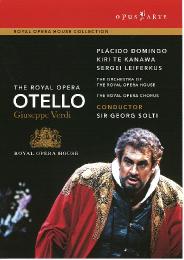
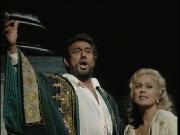
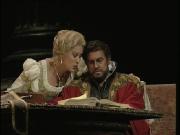
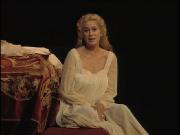
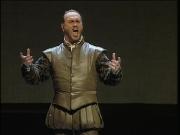
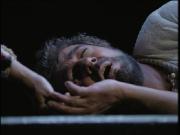
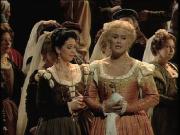
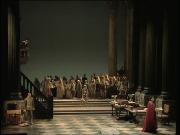
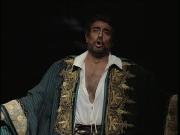













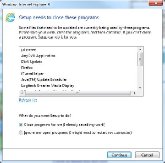


















Your Opinions and Comments
Be the first to post a comment!